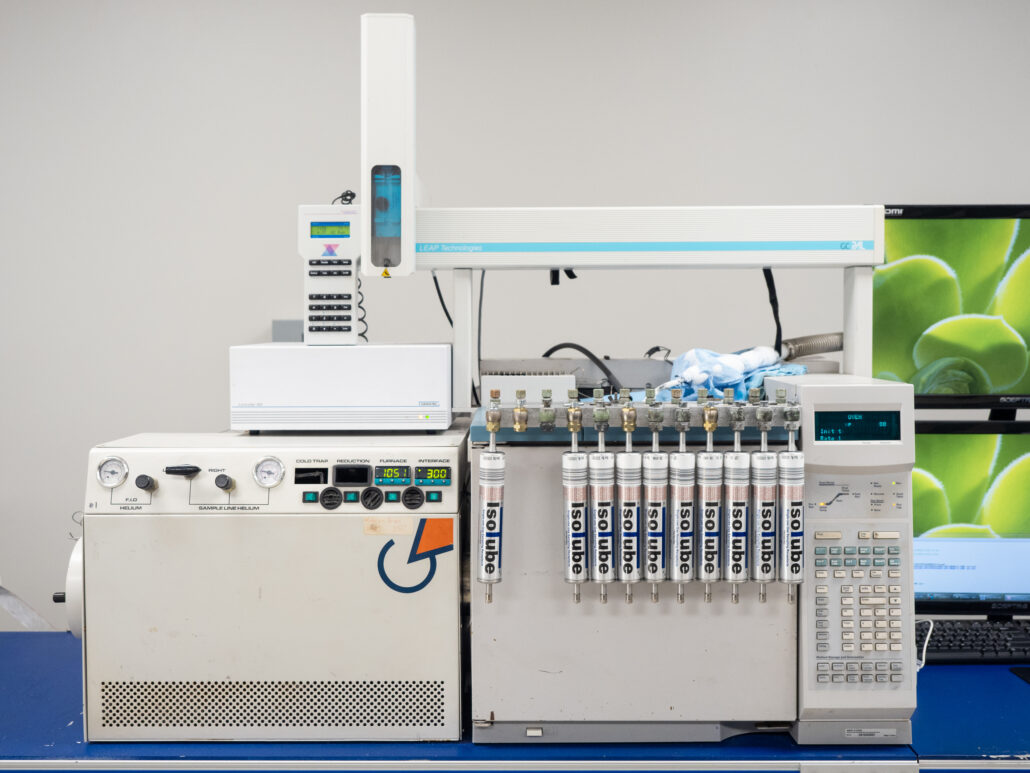Have any Questions?
GeoMark Research, Ltd.
9748 Whithorn Drive
Houston, Texas 77095
GeoMark Research, Ltd.
GAS ANALYSIS
Mud Gas Isotopes
Geochemical Characterization
GeoMark Research’s established Mud Isotope laboratory has been serving the industry for over 15 years, providing timely and trusted gas analysis data from exploration and production wells around the world. Our data provides insights to the following:
- Gas Compositions: Cost-effective screening technique to quickly identify hydrocarbon-bearing zones.
- Gas Classification (Biogenic vs. Thermogenic): Helps determine the source of gas encountered within a well.
- Maturity and Mixing: Evaluates delivery of gas source maturity and relative mixing between thermogenic and bacterial (insights to migration).
- Wetness: Identifies dry gas, condensate, or oil throughout the well.
- Connectivity: Assesses if reservoirs are connected or sourced from the same source.
- Helium: Exploration of alternative natural resources.

Mud Gas Analyses
- GC Compositions to C6+ including He, H2
- GC-IRMS Methane (C1) Carbon Isotope Compositions
- GC-IRMS Ethane (C2) Carbon Isotope Compositions
- GC-IRMS Propane (C3) Carbon Isotope Compositions
- Butane ((normal & iso) Carbon Isotopes
- Pentane (normal & iso) Carbon Isotopes
- Deuterium Hydrogen Isotopes
- CO2 Isotopes

The figures above present a selection of data outputs and interpretations that can be made from Mud Gas Isotope Analysis. Stable gas isotopic data (methane, ethane, propane, and higher molecules) have traditionally been used as geochemical sources and maturity markers and to indicate the relative concentrations of biogenic and thermogenic components in reservoir fluids. Collected over multiple wells, this data can be used to evaluate continuity between different zones in single and multiple wells; connected reservoirs should have similar isotopic values.
CO₂ Sequestration & Monitoring
Field-scale monitoring applications, such as those below, provide a cost effective, non-evasive and efficient option to assess the migration pathways of CO₂ plumes within storage reservoirs and produce quantitative evidence for formation/seal breakthrough.
CO₂ Plume Monitoring - Movement
CO₂ sequestration acts as Enhanced Oil Recovery (EOR), liberating less mobile hydrocarbons from the formation and driving them to a monitoring well.
The Benefits
- Mobility of shorter chained, less mobile hydrocarbons will be increased with increased pressure from CO₂ injection.
- Regular sampling and analysis of hydrocarbons from monitoring wells can provide an indication of CO₂ plume movement across a storage area.
CO₂ Plume Monitoring Formation/Seal Breakthrough
Baseline fluid families as defined by oil, gas and water analyses allows for the vertical fluid character (fingerprint) of each formation above, within and below the CO₂ injection reservoir.
The Benefits
- Regular sampling and analysis of fluid samples from monitoring wells can provide critical information on potential reservoir breakthrough events if sudden fluid family shifts are observed in the monitoring wells.